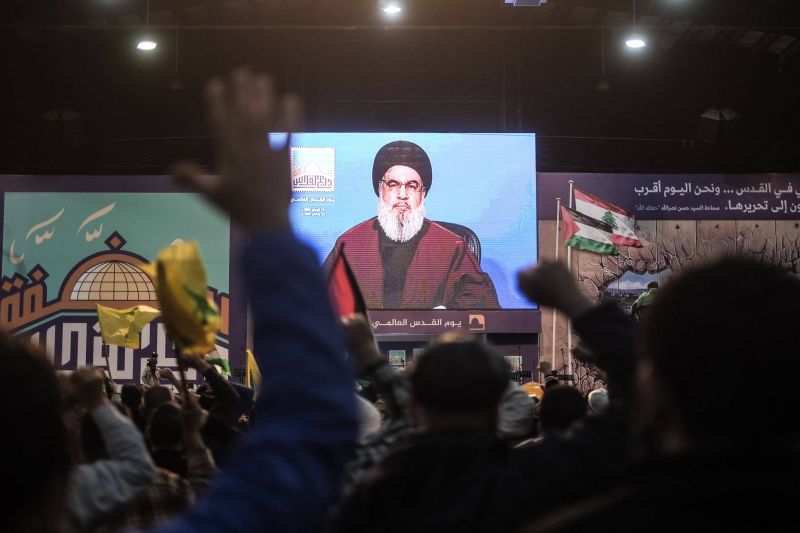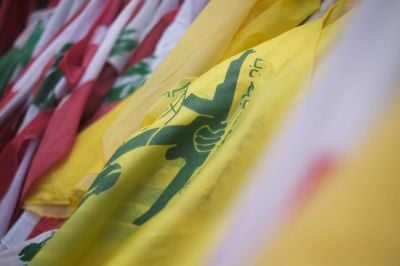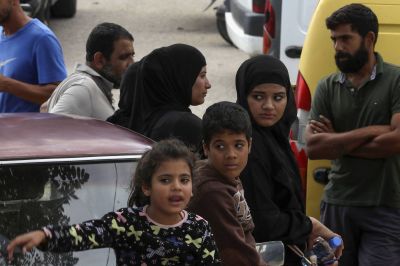
Hezbollah supporters in Lebanon attend a Hassan Nasrallah speech in 2023. (Credit: João Sousa/L'Orient Today/File photo)
Hoping it would secure a prisoner swap deal with Israeli counterparts, Hezbollah launched a cross-border raid on Israel on July 12, 2006, killing eight Israeli soldiers and abducting two others.
With Israel's subsequent intent of eliminating Hezbollah, events immediately spiraled into an all-out war, with Israeli warplanes pounding down on Hezbollah military targets as well as Lebanese civilian infrastructure.
Fast-forward 17 years. Following Hamas' “Al-Aqsa Flood” campaign of coordinated attacks on Israel last month from Gaza, Hezbollah and Israel have been engaged in skirmishes along the Lebanese border, as well. The intensity of the fighting has severely increased in recent days.
Hezbollah and Hamas have targeted civilian areas in northern Israel — areas that have been largely evacuated but nonetheless saw several civilian deaths and significant damage.
On the Lebanese front, Israeli shelling has so far killed at least eight civilians and 63 Hezbollah fighters, according to the latest count since Oct. 8.
Contrary to 2006, and owing to the 2006 war in itself, which wound up being a “reality check” for both sides, the 2023 fighting has so far remained — mostly — confined to the border. Why?
Different Israeli circumstances
In 2006, tensions were already high between Israel and Hezbollah prior to the latter's rocket attack and ambush, according to David Wood, Crisis Group's Senior Analyst for Lebanon.
“This violent [operation] came at exactly the wrong moment, because an Israeli man, Gilad Shalit, had just been kidnapped" by Palestinian militants in southern Israel near Gaza, he noted.
In March of that year, Israel also elected “a new inexperienced government,” Wood said, adding that “the Israeli public was demanding a response to Hezbollah, and there had already been this sort of pressure building up on successive governments for not cracking down on Hezbollah for doing this similar kind of kidnapping and operations at the border.”
“So there was this trigger — very quick, forceful, massive response aimed at eliminating Hezbollah.”
Between July 12 and Aug. 14, 2006, Israel imposed a land, air and sea blockade on Lebanon.
Over 34 days, Israel carried out thousands of air strikes while Hezbollah fired missiles into northern Israel.
According to Human Rights Watch, “the conflict resulted in at least 1,109 Lebanese deaths — the vast majority of whom were civilians — 4,399 injured, and an estimated one million displaced.”
Forty-three Israeli civilians died — mostly from Hezbollah rocket fire — and 117 Israeli soldiers were killed in the conflict.
However, today, the circumstances have changed in Israel.
Given current Prime Minister Benjamin Netanyahu's political standing, “a destructive war could do him damage,” according to Michael Young, a senior editor at Beirut's Malcolm H. Kerr Carnegie Middle East Center.
Some 76 percent of Israelis believe Netanyahu should resign, while 64 percent want the country to hold an election immediately after the war.
More weapons, more destruction
Despite Netanyahu threatening Hezbollah on Friday, saying his armed forces are able to “operate on all fronts and in all capacities,” he apparently remains cautious, warning the Iran-backed party in a televised statement not to open a second front against Israel.
“The reason why both sides don't want a war is because 2006 happened,” Young told L'Orient Today. It “ was a reality check for both sides. Sure, Hezbollah declared victory, but at the end of the day, it was a destructive war.”
On Aug. 14 of that year, a UN-brokered ceasefire went into effect though Israel's naval blockade on Lebanon lasted until Sept. 8.
Hezbollah declared the end of the conflict a "Divine Victory," whereas Israel viewed it as an unsuccessful effort and a lost chance at defeating the group.
“Today, the war would obviously be much more violent and far worse than in 2006,” Young said. “All sides are conscious of that.”
“Israel knows the fight with Hezbollah will be different than the fight with Hamas, partly because Lebanon is a country whereas Gaza is a small territory, in which the Israelis control access,” Young explained.
And the destruction Hezbollah will inflict on Israel “will be significantly greater than the destruction Hamas is inflicting from Gaza,” he added.
“Hezbollah has many more weapons than it did in 2006 and Israeli intelligence believes that it knows where they are,” Wood explained.
Hezbollah claims to possess a significant arsenal, including thousands of drones and more than 100,000 missiles, in addition to 100,000 fighters. Nasrallah also revealed in August that his party maintains a cache of precision-guided rockets, meticulously programmed to target critical nodes within Israel's advanced infrastructure.
In his Friday speech, Nasrallah threatened Israel that “it will be making the worst mistake if it attempts an offensive against Lebanon.”
Bad for both sides
Could Israel shift its focus to fighting Hezbollah after it's done with Gaza? Young says he is “not really convinced” it could be the case.
A pivot toward Hezbollah in Lebanon would result in “a more complicated and destructive war,” he added, especially as it might snowball into opening up more regional fronts.
“Both sides are aware that a war [in Lebanon] will be indecisive for either side — it will not yield a winner or a loser.”
Following Israel's aggression on Lebanon in 2006, “Hezbollah was lucky because there was some money to rebuild Shia villages and southern suburbs” that Israel had hit.
Foreign assistance, amounting to billions of dollars, helped rebuild much of the infrastructure of Beirut and southern Lebanon.
However, as Lebanon's today reels from a multifaceted economic crisis for the fifth year in a row, while losing ties with its previous Gulf investors, Hezbollah remains cautious.
Ambiguous threats, unanswered questions
In his Friday speech, Nasrallah said Friday that the “Al-Aqsa Flood” operation is “a 100 percent Palestinian decision,” distancing his party, for the time being, from joining the fight against Israel on a bigger scale.
He also announced that escalation on the Lebanese front depends on two things: The evolution of the situation in Gaza, and the behavior of the “Zionist enemy” towards Lebanon.
Yet he stopped short of threatening, concretely, a full-scale escalation like the one witnessed in 2006.
Nasrallah concluded: "I say this with full transparency and constructive ambiguity: All options on our front are open and under consideration, and we may resort to them at any time... We are a support front."
Wood noted that the extent of the force Hezbollah and its allies could respond with “will in large part depend on how well Hamas fights — if they fight well, then maybe Hezbollah can just maintain things at the current level. But if Hamas looks like it's going to get wiped off the map, then it depends.”
“Hamas is its ally. What kind of message does it send if you just let your ally get destroyed?”
However, Hezbollah is Iran's ultimate insurance policy and deterrent threat, Wood added. “Do the Iranians seriously want to risk an asset that is valuable, that they've invested so much time, money and effort in, and which is working so effectively for them, to save Hamas?
“I don't know the answer to that. It’s a hard one.”


